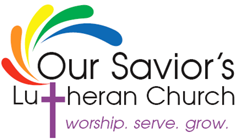Sunday, August 25, 2019 – Pentecost 11
August 25, 2019
Isaiah 58:9b-14
Luke 13:10-17
This morning our first reading is from Isaiah; specifically the reading is a portion of what is read on Yom Kippur, a religious holiday also known as the Jewish Day of Atonement.
The history of Yom Kippur dates back to the days when the Lord spoke to Moses and his brother Aaron, as recorded in the Old Testament book of Leviticus. In Leviticus, specifically in chapter 16, the Lord told Moses and Aaron how the people of Israel were to “atone” for their sins. In chapter 16 verse 5, the Lord said Aaron should “take from the congregation of the people of Israel two male goats for a sin offering…”
“He shall take the two goats and set them before the Lord at the
entrance of the tent of meeting; and Aaron shall cast lots on the two
goats, one lot for the Lord and the other lot for Azazel. (Leviticus 16:7-8)
Hence our young peoples’ message. The goat for the Lord was sacrificed as a sin offering, the goat for Azazel was sent into the wilderness as an atonement.
Atonement. It is derived from the phrase “at one.” “To be at one with someone is to be in harmonious personal relationship with” the person (“Atonement” in The Interpreter’s Dictionary of the Bible, volume 1, p. 309).
Rabbi Shai Held, president of the Hadar Institute in New York, wrote
On the Jewish Day of Atonement, the prophetic reading lands
like a stick of dynamite upon the congregation. By late morning,
when Isaiah is read, most of us are hungry and thirsty and perhaps
a little irritable from fasting. We’re right smack in the middle of
the holiest day of the year, a day centered on the hard work of
repentance and the joyous possibility of forgiveness, when the
words of the prophet come thundering at us, questioning just
what it is we think we’re doing in God’s house”(“Living the Word: August 25” in Christian Century August 14, 2019 p. 18)
Just what is it we think we’re doing in God’s house?
The question sounds a little like the religious leader who challenged Jesus when Jesus healed the woman who had been unable to stand upright. The leader said
to the crowd who saw the cure: “There are six days on which work ought to be done; come on those days and be cured, and not on the sabbath day.” (Luke 13:14). In essence, the leader was asking “Just what does he (Jesus) think he’s doing?”
How did Jesus answer the question?
Jesus answered with a question of his own: don’t you untie your donkey or your ox to lead them to water, on the Sabbath? If you can do that, why can’t I free this woman from her bondage in order that she might live?
Really, what Jesus is talking about is a matter of the heart. As is Rabbi Hart in the Rabbi’s commentary on our reading from Isaiah. The Rabbi explained this when the Rabbi wrote:
“Self-awareness can be hard to come by. We may believe ourselves
entirely sincere. Yet the prophet [Isaiah] has his doubts, so he offers
a kind of test: if our fasting comes coupled with a passion for justice
and a heart full of kindness, then our religious lives have integrity (source
cited above). If, on the other hand, our fasting convinces us that God is
in our pocket, then our religious lives are a scam, and God wants no
part of them.” (source cited above).
God cares about the burdens people carry, burdens that weigh people down, burdens that bind people, preventing them from living freely.
God wants us, as God’s followers, to care about the burdens people carry. God wants us to feed the hungry because hunger is a burden than weighs people down. God wants us to help heal peoples’ wounds because those wounds prevent them from living freely.
Jesus healed the bent over woman on the Sabbath because she was crippled, she was bound; her life was diminished. Her freedom and dignity was of much higher value than the need to keep order by properly observing the Sabbath. Jesus atoned for the sins of the world when he died and rose again, proclaiming victory making us “at one” with God.
Do we have a passion for justice? Are our hearts filled with kindness?
God promised the Hebrew people that
If you remove the yoke from among you,
the pointing of the finger, the speaking of evil,
1if you offer your food to the hungry
and satisfy the needs of the afflicted,
then your light shall rise in the darkness
and your gloom be like the noonday.
God will guide you continually,
and satisfy your needs in parched places,
and make your bones strong;
and you shall be like a watered garden,
like a spring of water,
whose waters never fail.
May this blessing fall on our hearts; that our lights rise in the dark and shine, bright as the sun at noonday. Amen.

